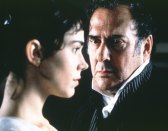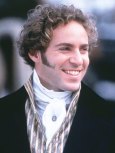Mansfield Park (1999)
 Cast:
Frances O'Connor, Jonny Lee Miller, Embeth Davidtz, Alessandro Nivola, Harold
Pinter, Lindsay Duncan, Sheila Gish, James Purefoy, Hugh Bonneville, Justine
Waddell, Victoria Hamilton.
Cast:
Frances O'Connor, Jonny Lee Miller, Embeth Davidtz, Alessandro Nivola, Harold
Pinter, Lindsay Duncan, Sheila Gish, James Purefoy, Hugh Bonneville, Justine
Waddell, Victoria Hamilton.
Music by: Lesley Barber.
Cinematographer: Michael Coulter.
Screenwriter: Patricia Rozema (from the novel by Jane Austen).
Director: Patricia Rozema.
Grade: B
Review by Dana Knowles.
It never hurts to remind ourselves of how far we've
come (or not) since Jane Austen put pen to paper and gave her distinctive voice
to women everywhere. This--more than anything--is what Mansfield Park
has on its mind. An agreeable and reasonably charming fusion of the titular
novel and Ms. Austen's personal writings, Patricia Rozema's film aims to illuminate
the social issues at the heart of Austen's narrative efforts, particularly those
concerning the narrow options that women have faced throughout human history. In
addition to the expected themes of class and feminine repression, it addresses
the role of slavery in wealth acquisition, which provides a more substantial
context for the social mores on display, as well as a parallel to the more metaphorical
"enslavement" of women in a society where lineage and marriage were the unquestioned
arbiters of every girl's fate.
At the center of this tale is Fanny Price (played with considerable charisma
and spunk by Frances O'Connor), a poor girl who has been shipped off to live
with wealthy relatives. The Bertram clan--headed by Sir Thomas (Harold
Pinter)--is of the idle rich variety, their wealth accrued (at least
in part) via the thriving slave trade near the dawn of the 19th Century. Lady
Bertram is the sister of Fanny's mother, and though conventional wisdom would
deem her the lucky one, she exists in a drug-addled haze from morning to night. The
Bertram children are a mixed bag. The eldest son/legal heir, Tom, drowns
himself in alcohol to mitigate the anguish he feels at the unspeakable source
of his impending fortune. The daughters, Julia and Maria, are giddy, girlish
snobs in search of appropriately well-heeled husbands. The only normalcy
(by today's standards) to be found is in second son Edmund (Jonny Lee Miller),
a self-effacing and pleasant young man with aspirations to a quiet life in the
parsonage. Edmund quickly becomes Fanny's ally and best friend, recognizing
in her the gifts that the rest of the world would never bother to look for. As
is typical of an Austen story, we know instantly that they're destined to be
together. The only question is how that will come to happen. 
The drama kicks into gear with the arrival of Mary and Henry Crawford (Embeth
Davidtz and Alessandro Nivola), wealthy siblings whose sophistication and carefree
joie de vivre pump life into the rather dull lives of the Bertrams. Mary
immediately sets her sights on Edmund, much to the chagrin of Fanny. But
rather than developing an explicit rivalry, the two charming women forge a friendship
that verges on romance. This is partly facilitated by Henry's pursuit of
Fanny, but stems mostly from their apparently genuine affection for one another.
Trouble comes when Fanny declines Henry's marriage proposal, a decision so shockingly
unfathomable to Lord Bertram that he exiles her back to the poverty of her immediate
family, where he hopes she will come to see the error of her arrogance and short-sightedness.
Only insanity or naiveté could move a girl of her class to eschew such a miraculous
opportunity to live the "good life." But Fanny is bound by her love for Edmund
and by her distrust of Henry's capacity for fidelity and authentic love. She
feels she has no choice but to follow her heart, and thus she accepts the exile
imposed.
There are other dramatic twists, some of which play as convenient occurrances
intended to manipulate the characters into the positions they most need to take. The
shift in character that reveals the hidden--and less savory--nature of Mary
Crawford feels particularly abrupt and unconvincing. And the family crisis
that allows for the return of Fanny to the Bertram estate is only marginally
less unconvincing. They feel like mechanical--as opposed to organic--"plot
points," which they most certainly are.
There is much to admire in Mansfield Park. The production is handsomely
staged and shot. The performances are mostly quite good (Davidtz, Nivola,
Miller, Duncan) or genuinely memorable (O'Connor and Pinter). The story
is adequately engaging, occasionally indulging in quirky humor that lightens
the period mood with an air of wry modernity. The themes are interesting,
if worn a bit too blatantly on the sleeve for my personal taste. Ultimately,
however, Mansfield Park falls a bit flat. The central romance between
Fanny and Edmund is devoid of the sense of repressed passion that is necessary
to maintain a reasonable level of urgent concern while we await the obvious
outcome. Edmund is simply too bland a character to evoke much in the way
of emotion. We know he's right for Fanny. We want them to find a way
to end up together. But we never yearn for that resolution. When
it comes, it feels like we've simply passed onto the next logical step, and
thus the film can properly end. What's missing is the sort of emotional engagement
that gave depth and resonance to the respective plights of those sisters in
Sense and Sensibility. There was no greater degree of doubt about how
their fates would unfold, but that film gave us reason to care every step of
the way. I liked Mansfield Park, but never surrendered to it. Instead,
I found it to be a likable couple of hours spent with reasonably engaging people
who pretty much ended up getting what they deserved. If that sounds a bit
dispassionate, then I guess I've accurately conveyed my response.
Review © December 1999 by AboutFilm.Com
and the author.
Images © 1999 Miramax. All rights reserved.
 Cast:
Frances O'Connor, Jonny Lee Miller, Embeth Davidtz, Alessandro Nivola, Harold
Pinter, Lindsay Duncan, Sheila Gish, James Purefoy, Hugh Bonneville, Justine
Waddell, Victoria Hamilton.
Cast:
Frances O'Connor, Jonny Lee Miller, Embeth Davidtz, Alessandro Nivola, Harold
Pinter, Lindsay Duncan, Sheila Gish, James Purefoy, Hugh Bonneville, Justine
Waddell, Victoria Hamilton.


